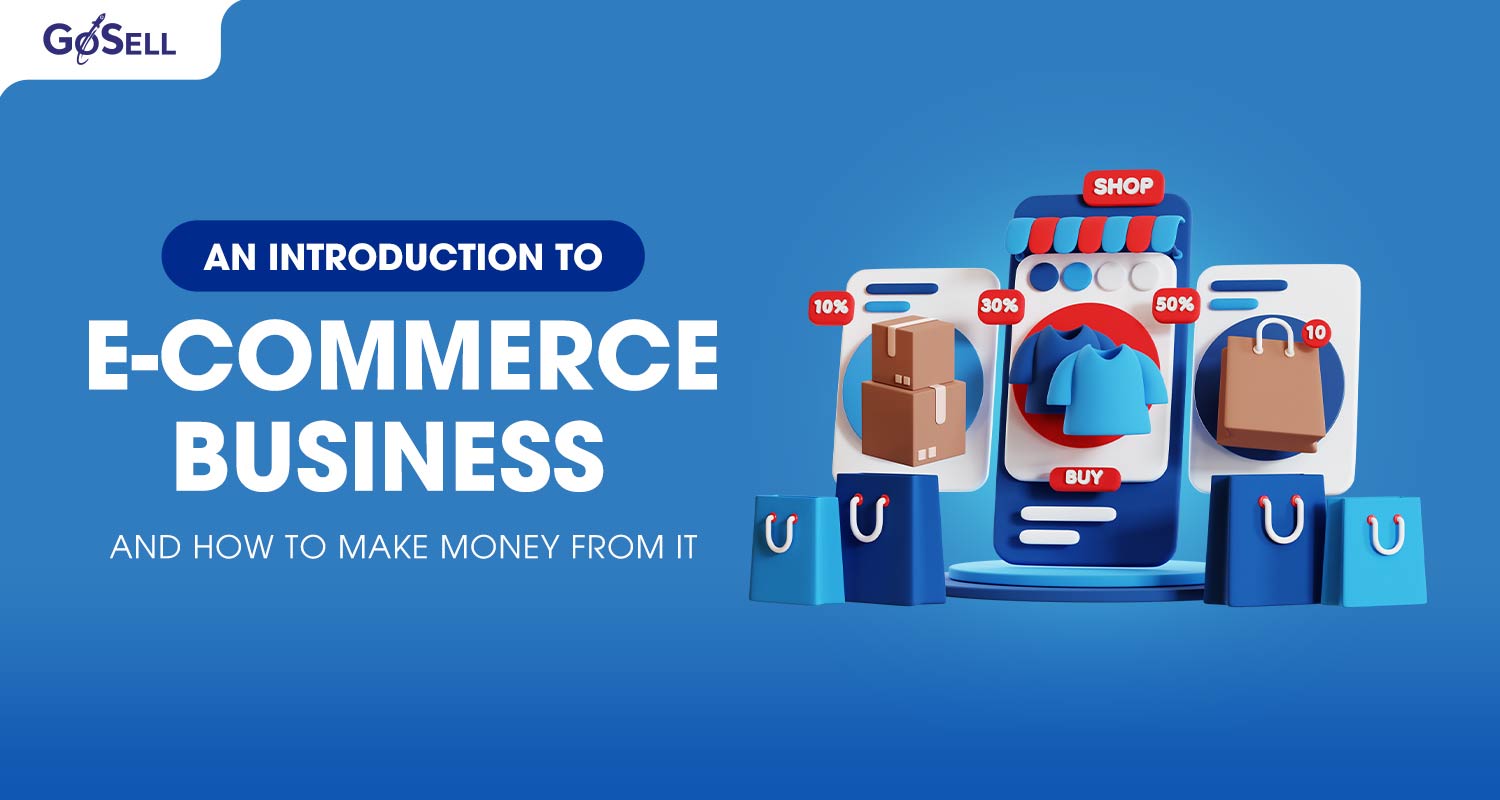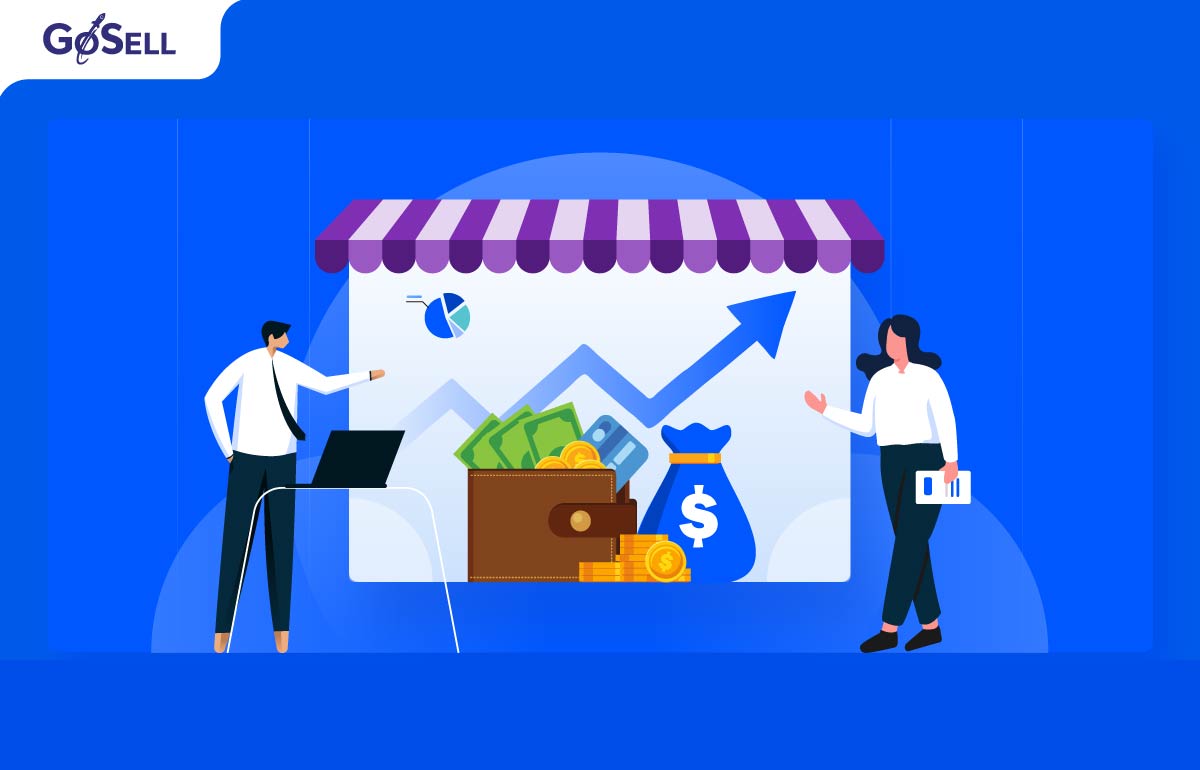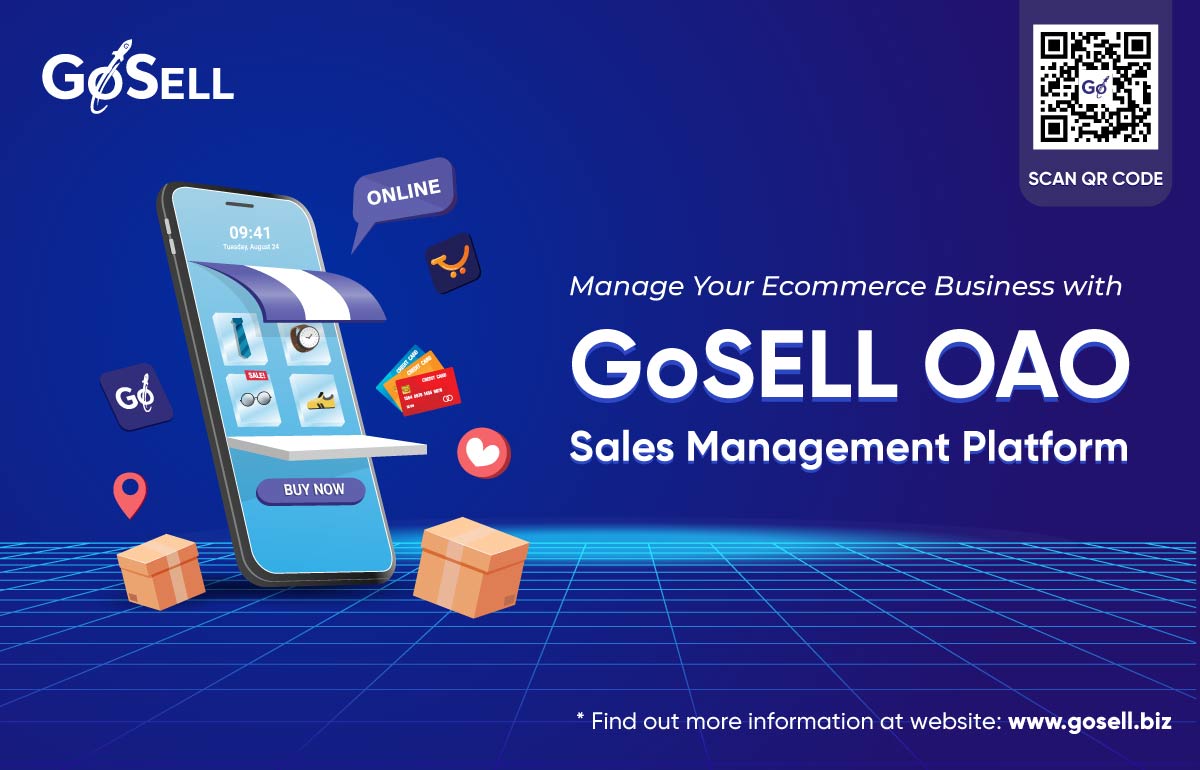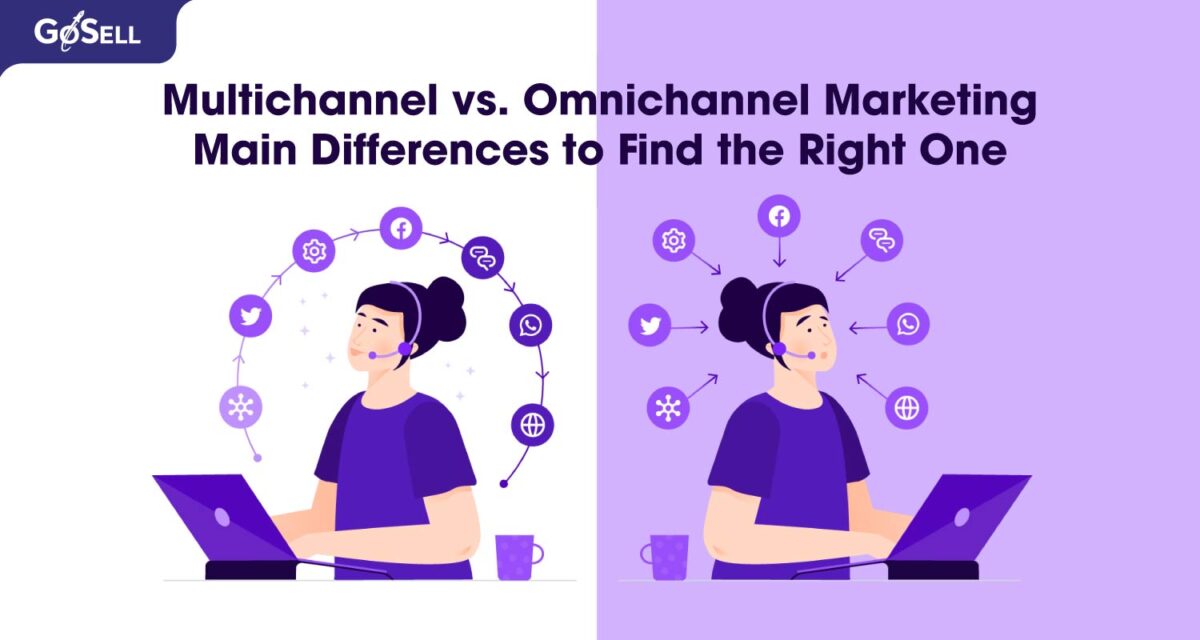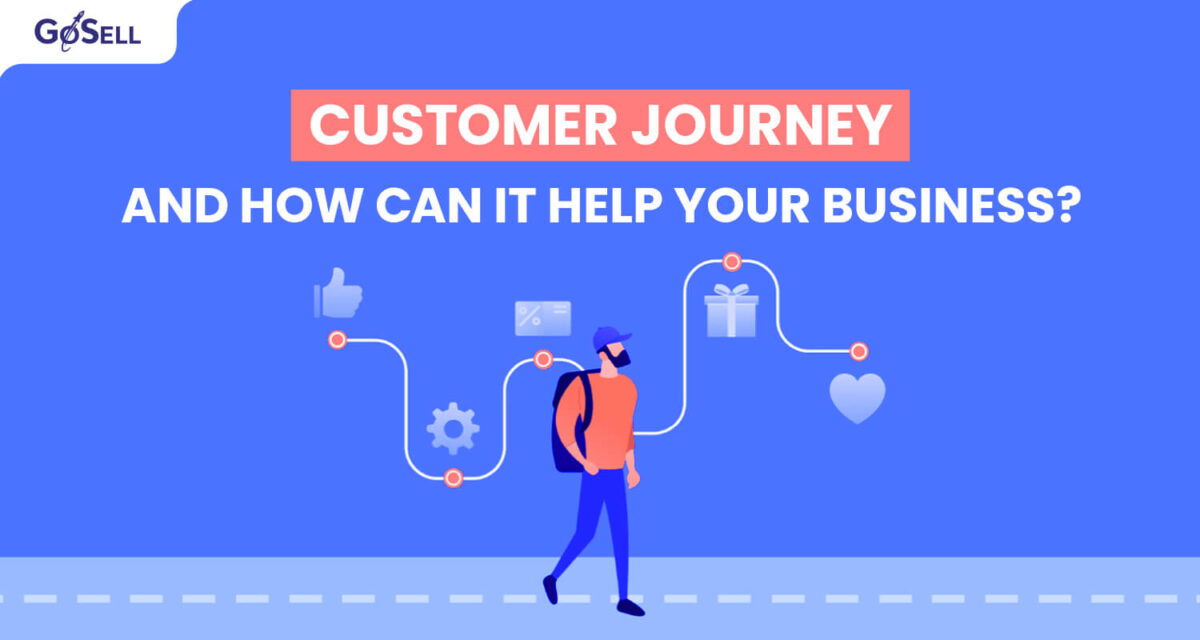Modern digitalization era makes business transform nonstop day by day. Selling and shopping online is preferred compared to traditional ways. If you’re wondering “what is ecommerce” look no further. GoSELL has all the information you need right here. Additionally, you’ll discover how to launch an online store, manage it, and a lot more.
Ecommerce: What is it?
Ecommerce definition
E-commerce, often known as “electronic commerce” is a general phrase that refers to everything that has to do with purchasing or selling things online. Any spelling variant is acceptable, because they all refer to the same activity—doing business online.
In terms of writing, ecommerce is a shorter form of “electronic commerce” which fundamentally describes the action of a business providing services or products via online platforms to make money. Specifically, online purchasing and selling of physical goods and services is known as e-commerce. To complete a transaction, more than one party is involved, along with the transfer of money or data. It is a component of the larger field of electronic business (e-business), which includes all of the procedures needed to run a business online.
Ecommerce business definition
An ecommerce business is when a business gains its profits by selling its goods or services over the Internet. In particular, ecommerce business is defined as a two-party transaction, typically between businesses (B2B) or business-to-consumers (B2C). Through a B2B online marketplace of their choosing, the vendor advertises goods or services for sale online. The product is discovered and purchased online by the client (either another company or a direct consumer). The buyer receives a digital product immediately away. Physical goods are delivered to the address of the buyer’s choice.
There are a huge variety of various ecommerce business models because the term “ecommerce” is so broad. In this post, GoSELL will go into greater detail about the various e-commerce business models that e-commerce business owners can operate.
Types of Ecommerce Business Models
The majority of businesses now use a hybrid or omnichannel strategy to sell their goods or services because the border between offline and online has almost vanished. The most common forms of ecommerce business models are described below.
B2B Ecommerce business model
The term B2B means business to business. This category includes e-commerce companies that provide physical or digital goods and services to other companies. For illustration, this may include producers or suppliers who give goods or materials to other companies. A wholesale website like Alibaba, Amazon, eBay, which enables business-to-business commerce sales through its platform, are examples of B2B eCommerce. The eCommerce sector is given considerable attention in the overall picture of B2B strategies designed for a dynamic expansion in the modern world.
In the twenty-first century, a business that neglects to invest in digital platforms will soon find itself behind the competition. More than any other channel, individuals are prepared to buy anything today online. Therefore, if businesses want to generate millions of dollars in sales, they should consider making a smart investment in a B2B ecommerce platform.
Additionally, B2B customers today want the freedom of shopping experience. In other words, B2B customers demand a seamless shopping experience, which includes a speedy checkout, prompt delivery, simple and automatic repeat orders, and better tracking. Any business in the market needs a strong B2B e-commerce website to manage all of these criteria because it improves customer experience at a higher level, which may help increase conversion rate over time to increase profitability.
B2C Ecommerce business model
The term “business-to-consumer,” or B2C, refers to a business strategy that relies on exchanges between a corporation that sells goods or services and particular customers who are the items’ final users. Specifically, when a business sells a service or something directly to a customer, this is known as a B2C business model. In well-known B2C firms like Amazon, eBay, Walmart, and others, individual customers are the final users of a good or service.
An alternative to the business-to-business (B2B) strategy is the business-to-consumer (B2C) model. B2C is a company model that frequently has more customers, but also has lower revenue per customer and quicker sales cycles. For instance, most of the time B2C businesses have a certain number of target audience groups, unlike B2B businesses when they are targeting other companies. And different targets bring different results, in that case, individual customers of B2C would definitely bring lower earnings compared to the B2B model.
In particular for lower-value products, the decision-making process for a business-to-consumer (B2C) transaction is significantly quicker than a business-to-business (B2B) buy. Compared to their B2B counterparts, B2C bussinesses often spend less on marketing while also having shorter sales cycles, smaller average order values, and less repeat business.

The B2C business model is, in a nutshell, the act of selling any goods or services directly to clients without the need of a middleman. The end users of the products or services and the business owners perform this sort of business together.
Read more: 5 helpful tips to create a website that help increase your sales
The Advantages and Disadvantages of ecommerce business models
Everything has 2 sides which are good and bad, and so does ecommerce business. Knowing pros and cons will help you optimize your own ecommerce business by taking full advantages from what it can offer and avoiding or solving the problems it brings.
Here are some advantages from ecommerce business:
- Its convenience: Ecommerce business helps you sell your products 24/7. Your business can always be open for the customers to make a purchase even while you are sleeping. Increasing numbers of order and revenue will be effective.
- Greater availability: Compared to their brick-and-mortar counterparts, many stores carry a wider range of products online. Additionally, a lot of online-only companies may provide customers with exclusive stock that is inaccessible elsewhere.
- Reduced overall start-up costs: Ecommerce businesses often don’t need a physical storefront, although they may need a warehouse or manufacturing facility. Digital operations frequently cost less than paying rent, insurance, building maintenance, and property taxes.
- International sales: An e-commerce business is not constrained by physical geography and can sell to anyone in the globe as long as it can ship to the client.
- Retargeting clients is made simpler by the fact that it is simpler to draw their attention to strategically positioned adverts, targeted marketing initiatives, or pop-ups that are intended to serve a particular function as they browse a digital storefront.
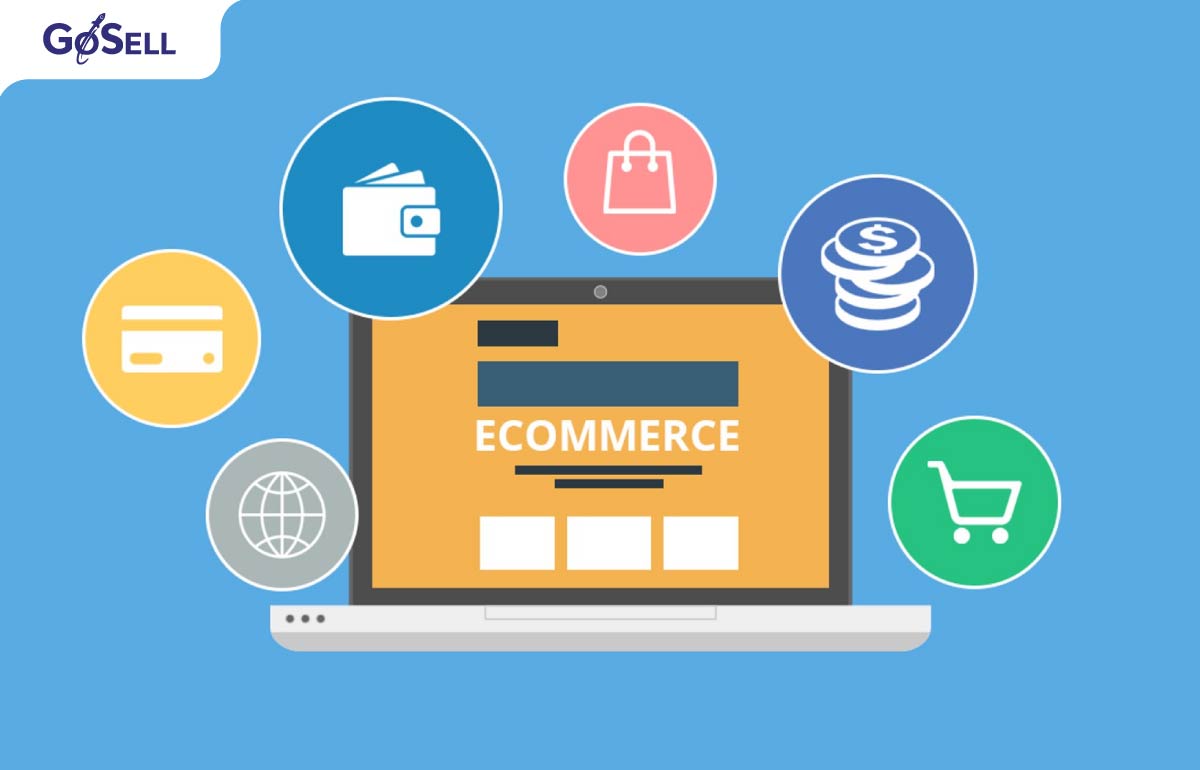 However, there are also certain disadvantages associated with e-commerce websites. The drawbacks comprise:
However, there are also certain disadvantages associated with e-commerce websites. The drawbacks comprise:
- Restricted customer service: If you buy a computer online, you can’t just ask a salesperson to show you the features in person. Additionally, although some websites allow you to communicate online with staff, this is not a common occurrence.
- Lack of immediate gratification: When purchasing something online, you must wait for delivery to your house or place of business. E-tailers like Shopee, however, lessen the agony of waiting by providing same-day delivery as a premium option for a few products.
- Lack of physical product contact: Because online photos do not always accurately represent a product, online purchases may not be fulfilling when the final product does not live up to expectations. As an illustration, a piece of apparel might be constructed of inferior fabric than its web depiction suggests.
- Dependence on technology: If your website crashes, receives excessive traffic, or needs to be temporarily shut down for whatever reason, your business is effectively shut down until the ecommerce shop is up and running again.
- Increased competition: Whereas the low cost of entry is a benefit, it also means that other competitors can enter the market with ease. In order to ensure that they have a digital presence, e-commerce businesses need to be careful with their marketing tactics and vigilant with SEO optimization.
Strategies to increase revenues
In most of situations, any kinds of ecommerce business model wants to earn as much as possible, so here are some ways you can take as references for your business:
Focus on your market and target audience
Your business’s ecommerce income might be increased by concentrating on your target market. You need to understand who your target market is, what they are looking for in a product or service, and how they evaluate different options.
Connect with current consumers and enquire about their expectations for the product to get information. You can determine the consumer persona by doing this.
Make use of product reviews to your advantage
Giving honest and creative product reviews is the next step in increasing ecommerce income. Customers may make or break a deal since they are the market king. Allowing customers to leave some comments, reviews and feedback is a wise method to help you increase revenue. The more positive product reviews, the more new customers you will attract. Because customers usually have the habit of reading product reviews on ecommerce platforms before they make a purchase decision, trying to maintain good product reviews will increase both the conversion rates and revenue.
However, even if you receive negative feedback, do not attempt to remove them. A better way to solve the situation is to offer solutions for the owner of that feedback immediately right after they posted it on your network sites. This helps you to equalize the integrity of your reviews section to let others see that your business is transparent and dedicated to every customer.
Utilize social media to the fullest extent possible
The next way to boost eCommerce sales is by leveraging social media exclusively. Your firm won’t grow just by using a website. Utilize social media by placing advertisements on your website. By utilizing several platforms, you may boost sales and expand your organization.
Consider a mobile app
Developing a mobile application will boost your company’s ecommerce sales. The number of people using mobile phones daily is increasing in the modern era. Apple or Android-powered devices are used by almost everyone. Having an app helps customers conveniently view your products/services.
Consequently, creating a mobile app will aid in boosting sales. Users of the mobile app may access your website by tapping the app’s icon.
There are a few important ways that your business can apply to increase your profits when doing ecommerce business.

Manage your ecommerce business well with GoSELL
The GoSELL sales management platform, which has a firm grasp of the growth of ecommerce business, enables you to create online company platforms and efficiently manage business operations.
Building your ecommerce sites with GoWEB
Using GoWEB, you can simply develop a website within 10 minutes, regardless of your level of coding proficiency or even if you have none at all.
Use GoAPP to build a sales app
As mentioned above, having a mobile app is a great way to boost the ecommerce business’s revenue. GoSELL provides GoAPP as a product which you can create your own business’s app. With a sales app, your shop is constantly visible to shoppers on their phones. Increase your visibility so that customers may find you more easily. Boost the effectiveness of personal brand development.
Promote products with GoLEAD
GoLEAD‘s landing page design service is a highly helpful tool for promoting products. Simply assist companies in promoting their goods, gathering data to generate a sizable database of potential clients, minimizing costs while still developing successful marketing plans.
Other supportive features for your ecommerce business from GoSELL
GoSELL oversees ecommerce operations. GoSELL designed an admin page to support businesses in connecting and processing information of exchanges straight on this admin page at a single screen after taking into account the aforementioned trends and the needs of businesses. GoSELL can assist you with the following sales channels on the e-commerce platform. And because the article has indicated some ways to help increase ecommerce business above, GoSELL would like to introduce to you that GoSELL integrates more than 30 features to help you use it as a strategy to increase revenue. Here are some suitable and significant that an ecommerce business needs:
- Product review: The feature helps you understand customer satisfaction level so that you can provide them with good customer service. Therefore, the customer experience will be increased and the products or services will be improved.
- Facebook Pixel: facilitates user data collection and activity tracking while tracking the effectiveness of Facebook Ad campaigns. With the help of this tool, you may enhance Facebook conversion rates by tailoring the quality of your advertising to your target market and developing effective marketing/remarketing campaigns.
- Google Analytics: The user experience of the website or sales app may be improved by taking into account the requirements and desires of the users, which will help you raise sales productivity. The feature enable the capability of tracking and viewing customer action whenever they interact with one of your platform such as website, app, etc.
Supporting businesses with detailed visual revenue analysis and reporting
- Follow each branch’s sales performance to analyze, compare, and provide ways to enhance and optimize the sales process.
- Classify the product code accurately to speed up the import of the best-selling item, and make plans to change the item that sold less.
- Calculate profit, revenue, expenses, shipping fees, etc., automatically 100% by day, week, month, and year.
GoSELL believes that the aforementioned post has given readers a better understanding of ecommerce and how to run ecommerce businesses successfully in the modern era.
